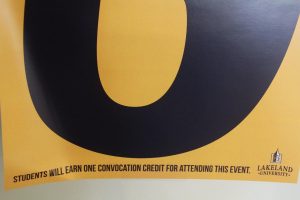The convocation obligation
May 5, 2017
Convocations. Some students will cringe at their mention.
Convocations are an exclusive Lakeland University requirement; students must attend 24 convocation-credited events in order to graduate. It’s simple enough to understand.
However, these convocations that start out as a well-intentioned effort to expand students’ education often wind up being an obligation that many students drag themselves to simply for graduation purposes rather than for enlightenment.
One Lakeland alumni said, “I enjoyed going to the musicals and band performances. I tried to get as many of my convocations done by attending those. Most of the others I went to just because I had to, I don’t even remember what they all were.”
Some convocations include guest speakers on varying topics. I wonder how often a room is filled with students cramming in their convocation attendances, spending the entire hour or more with their faces buried into their phones, and how this reflects on the campus to the community members in attendance.
In no public university will you find a requirement to attend sanctioned events in order to graduate. General studies electives, or the majority of credits that go toward an associate degree, is considered proof of the well-rounded education universities aim to bestow upon their students.
Remember taking an English literature course even though your major is microbiology? Pray to any higher powers that you made it through your advanced algebra exam in order to continue your sociology degree?
Or maybe you paid a couple hundred bucks for a Business 101 course that you had no need to sit through, but you needed some electives, something to “expand” your education. Didn’t that fulfill the requirements of a well-rounded education?
So now, on top of all their academic work, students need to put in even more time outside of class, outside of work, outside of their families and other obligations in order to fulfill their convocation requirements for graduation.
There are students who have finished all of their academic requirements for a degree, but were never handed their diploma due to not meeting their convocation requirements.
The statement that comes up often regarding convocations is that “they benefit students in the end.” That statement, while well-intentioned, sounds like a statement you hear in your youth from teachers or parents, “It’ll be good for you.” As a campus of adults enrolled in secondary education (with ever-increasing tuition costs), don’t students already have a keen grasp of “what’s good for us?”


